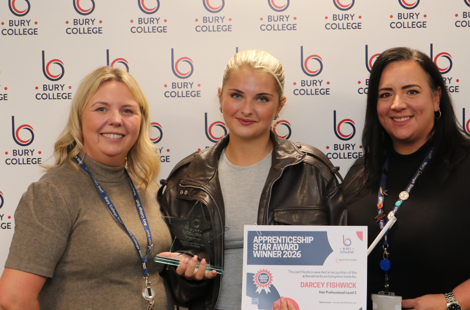
Read how Codi has used the skills of her Catering course at Bury College to support her journey to becoming a restaurant owner.
This website is run by Bury College. We want as many people as possible to be able to use this website. For example, that means you should be able to:
We’ve also made the website text as simple as possible to understand.
AbilityNet has advice on making your device easier to use if you have a disability.
Bury College is committed to making its website accessible, in accordance with the Public Sector Bodies (Websites and Mobile Applications) (No. 2) Accessibility Regulations 2018.
This accessibility statement applies to Bury College’s website.
This website is partially compliant with the Web Content Accessibility Guidelines version 2.1 AA standard, due to the exemption listed below:
The content listed below is non-accessible for the following reason(s):
(a) non-compliance with the accessibility regulations
Some PDFs documents are not fully accessible to screen readers, and so people using a screen reader cannot access the information. This fails:
Some of our PDFs don’t currently meet accessibility standards – for example, they may not be marked up so that they are accessible to a screen reader. We now have processes in place to make replacements in an accessible format. Any new PDFs we publish will meet accessibility standards, unless we determine that they represent a disproportionate burden within the meaning of the accessibility regulations.
We are working towards addressing this by removing older PDF documents and replacing them with accessible documents, or accessible web page content where this does not represent a disproportionate burden.
Please contact the Marketing Team (marketing@burycollege.ac.uk) if you have difficulty with any of the PDFs on the site and we will work to provide you with the content in an alternative, more accessible format.
We regularly monitor the accessibility of this website using automated Quality Assurance software. We use this software to identify and fix any issues that arise. We also use tools such as Deque Axe, Google Lighthouse and WAVE to assess our websites and find and fix issues.
We work with our suppliers and third parties to ensure compliance with standards and plan for improvements and fixes where possible.
The Public Sector Bodies (Websites and Mobile Applications) (No. 2) Accessibility Regulations 2018 require public sector bodies, subject to various exemptions and conditions, to:
The accessibility regulations state that a public sector body does not need to meet the accessibility requirement if this would put a disproportionate burden on them, provided that a disproportionate burden assessment is undertaken. The following disproportionate burden assessments relate to inaccessible PDFs on our site.
Some of our PDFs are documents that are essential to be made public for Governance reasons (e.g. Corporation meeting minutes). Our assessment of the burden of making all of the PDFs on our site into accessible versions is that:
Also relevant to this decision are that:
Where documents are no longer in active use, or no longer being updated, there is a high cost in terms of employee hours to convert. Some documents are part of the public record, but no longer represent the current position, and interest is limited. We will always respond to requests for different formats on a case-by-case basis, so accessible versions are available on demand.
We consider that the costs of converting older documents where there is little evidence of demand would be a poor use of limited staff time and would represent a disproportionate burden on the organisation in terms of cost.
site contains third-party content. We do not have control over and are not responsible for the accessibility of this content, but we endeavour to work with the third party to improve its accessibility. This may include:
We are always looking to improve the accessibility of our site, so if you find anything on the site difficult to use or wish to provide us with feedback on what could be improved we would welcome this feedback.
Please contact the Marketing Team by either:
To help us understand the problem as quickly as we can, please can you provide:
The Equality and Human Rights Commission (EHRC) is responsible for enforcing the Public Sector Bodies (Websites and Mobile Applications) (No. 2) Accessibility Regulations 2018 (the ‘accessibility regulations’).
If you’re not happy with how we respond to your complaint, please contact the Equality Advisory and Support Service (EASS).
The statement was prepared following an evaluation of the website by the Government Digital Service.
This statement was prepared on 23rd September 2024. It was last reviewed on 23rd September 2024.
This website was last tested on 17th September 2025.
This website was tested against the WCAG 2.1 AA standard. It was tested via automated testing, performed on 20 randomly selected pages, including the Home page. It was also tested via automated and additional manual testing, performed on the Top 30 most visited pages on the site.
The statement will be reviewed annually, and/or following a substantial revision of the website.


Read how Codi has used the skills of her Catering course at Bury College to support her journey to becoming a restaurant owner.

Bury College welcomed a delegation from China and guests from the University of Salford for a curriculum showcase visit focused on vocational education, technical skills and international collaboration.

National Apprenticeship Week was an exciting and inspiring time at Bury College, filled with activities that helped mark the occasion and celebrate the exceptional talent, dedication and achievements of Apprentices.

On Monday 9th February, Bury College’s Hairdressing Apprentices came together for a charity Blowdryathon, raising almost £500 for Little Lady Locks during National Apprenticeship Week!
_470x310.png)
On Wednesday 11th February, as part of National Apprenticeship Week celebrations, Bury College proudly hosted an Apprenticeship Star Awards Ceremony.
_470x310.png)
Employers - did you know that now is the perfect time to start thinking about your school leaver Apprenticeship vacancies?